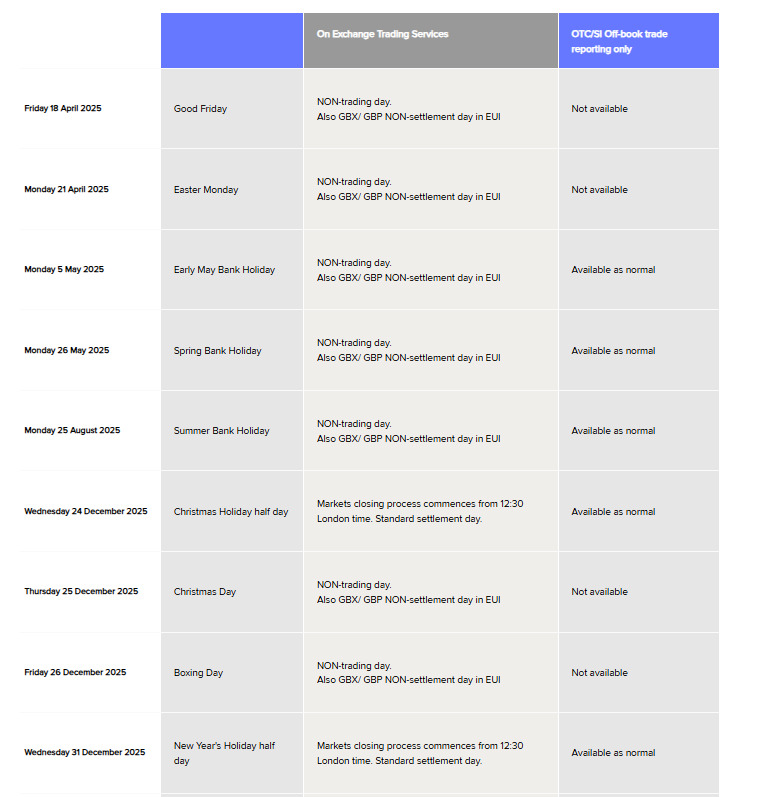Investing
London Stock Exchange Opening Hours: Key Dates for 2025

The London Stock Exchange (LSE) is where the UK’s biggest companies, top stocks, and serious money moves daily. Whether you're actively trading or just keeping an eye on the market, knowing the LSE opening hours and when it closes is crucial.

From regular trading hours to holiday closures, special sessions, and insider tips, this guide will make sure you never miss a beat when it comes to timing your trades right — especially if you're learning how to invest in FTSE 100 stocks or tracking key UK-listed shares.
LSE trading hours 2025
If you’re looking to jump into action, the London Stock Exchange runs Monday to Friday, opening at 8:00 AM and closing at 4:30 PM GMT. Unlike some global stock exchanges, the LSE does not have a lunch break, just continuous trading from start to finish.
The LSE’s busiest moments usually happen right at the opening bell (8:00 AM) and during the closing auction (4:30 PM), when major investors make their moves.
The LSE is completely closed on Saturdays and Sundays, but if you’re eager to trade, there are alternatives like CFDs and other platforms that offer extended-hour trading.
Extended trading sessions
Beyond standard trading hours, the London Stock Exchange offers extended trading sessions for institutional investors and market participants who need extra flexibility.
Pre-trading session
Before the official opening at 8:00 AM, the LSE operates a pre-trading phase from 5:05 AM to 7:50 AM. This session allows traders to enter, modify, or cancel orders before the main market opens. However, no actual trading takes place during this time.
Post-trading session
After the market closes at 4:30 PM, the LSE enters a post-trading session, lasting until 5:15 PM. This period is used to process outstanding trades, adjust positions, and manage end-of-day orders.
London Stock Exchange holiday closures
The London Stock Exchange follows the UK’s public holiday schedule, meaning the market remains closed on specific days throughout the year.
LSE public holidays 2025/26
Below is the list of LSE holiday closures for 2025:
- New Year's Day – Wednesday, 1 January
- Good Friday – Friday, 18 April
- Easter Monday – Monday, 21 April
- Early May Bank Holiday – Monday, 5 May
- Spring Bank Holiday – Monday, 26 May
- Summer Bank Holiday – Monday, 25 August
- Christmas Holiday half day - Wednesday, 24 December
- Christmas Day – Thursday, 25 December
- Boxing Day – Friday, 26 December
- New Year's Holiday half day - Wednesday, 31 December
Below is the list of LSE holiday closures for 2026:
- New Year's Day – Thursday, 1 January
- Good Friday – Friday, 3 April
- Easter Monday – Monday, 6 April
- Early May Bank Holiday – Monday, 4 May
- Spring Bank Holiday – Monday, 25 May
- Summer Bank Holiday – Monday, 31 August
- Christmas Holiday half day - Thursday, 24 December
- Christmas Day – Friday, 25 December
- Boxing Day – Friday, 26 December
- New Year's Holiday half day - Thursday, 31 December
On these dates, the London Stock Exchange will be closed, meaning no trading will take place.
Half-day trading and special cases
In addition to full closures, the LSE operates on a shortened schedule on specific days as listed above.
Let's have a closer look:
- Christmas Eve (24 December) – The exchange may close early, typically around 12:30 PM.
- New Year's Eve (31 December) – A half-day session may occur, with trading ending at 12:30 PM.
If you're planning major trades or repositioning your portfolio, knowing these dates is essential so you’re not caught off guard when the market suddenly goes quiet.
If you're planning major trades or portfolio adjustments, it's best to do so before a holiday closure to avoid potential price swings when the market reopens.
How to Invest Over a UK Market Holiday
Step 1: Consult your investment plan.
Use holidays as a chance to review your portfolio and long-term goals. Avoid making impulsive changes—market closures often provide a good pause for reflection rather than reaction.
Step 2: Determine whether you should rebalance.
If your asset allocation has shifted—say stocks have grown faster than bonds—plan any rebalancing for after the holiday, when markets open and transactions can settle smoothly.
Step 3: Allow compound interest to keep working.
Even during holiday closures, investments within tax-efficient wrappers (like ISAs or pensions) continue to benefit from compound growth. Stay patient and focus on long-term progress.
How to Trade Over a UK Market Holiday
Step 1: Understand full holidays and partial holidays.
Know when the market is fully closed (e.g., Easter Monday) versus half-days (e.g., Christmas Eve or New Year’s Eve, often closing early around 12:30 PM). This helps plan order timing and avoid unexpected downtime.
Step 2: Exit positions you don't want to hold over a holiday.
Markets can react to news released while closed. If you’re concerned about volatile events or announcements, consider closing or hedging open positions before the holiday begins.
Step 3: Monitor economic developments over the holiday.
Keep an eye on global news, earnings reports, or macroeconomic events that may break during the closure. These can create price gaps when markets reopen. Being informed helps you prepare effectively.
Key takeaways
At the end of the day, whether you’re day trading, investing long-term, or just keeping an eye on market trends, understanding when the LSE is open and how it operates can make all the difference.
- The LSE operates Monday to Friday, from 8:00 AM to 4:30 PM GMT.
- Pre-trading (5:05 AM – 7:50 AM GMT) and post-trading (4:40 PM – 5:15 PM GMT) sessions offer extended flexibility.
- The exchange closes on UK public holidays, and certain dates (like Christmas Eve) may have half-day trading.
- Market liquidity peaks at the opening and closing sessions, influencing price movements.
- Comparing the LSE’s hours with other global stock exchanges can help international investors time their trades effectively.

FAQs
Is the London Stock Exchange open on weekends?
No, the London Stock Exchange is closed on Saturdays and Sundays. Trading is only available Monday to Friday during regular market hours. However, some investors trade UK stocks through alternative platforms, such as over-the-counter (OTC) markets or contracts for difference (CFDs), which may offer weekend trading.
Can I place orders when the London Stock Exchange is closed?
Yes, you can place pending orders (such as limit orders or stop-loss orders) when the market is closed, but they will only be executed once the LSE opens for trading. Orders placed during pre-trading hours (5:05 AM – 7:50 AM GMT) can also be adjusted before the official market open at 8:00 AM GMT.
What happens if a major event occurs when the market is closed?
If a significant financial event, such as economic data releases, geopolitical events, or corporate earnings reports, occurs while the LSE is closed, the market may open with a price gap. This means that stock prices could jump or drop significantly when trading resumes, as investors react to the news.
Does the London Stock Exchange adjust for daylight saving time?
The UK operates on Greenwich Mean Time (GMT) in winter and British Summer Time (BST) in summer. During BST, time is one hour forward of GMT, essentially changing from UTC+00:00 to UTC+01:00.
What is the auction period on the London Stock Exchange?
The LSE operates opening and closing auctions, where orders are matched to determine the opening and closing prices of securities. These occur:
- Opening Auction: From 7:50 AM to 8:00 AM GMT (before regular trading starts).
- Closing Auction: From 4:30 PM to 4:35 PM GMT (after the market closes).
These auctions are particularly important because they help establish fair and transparent opening and closing prices based on supply and demand.